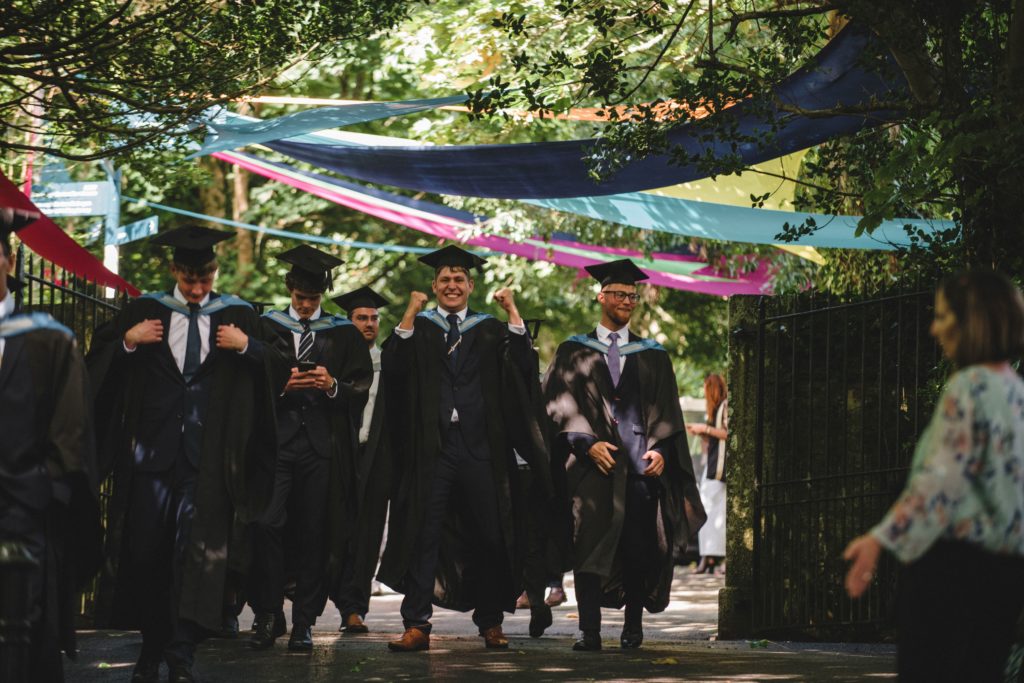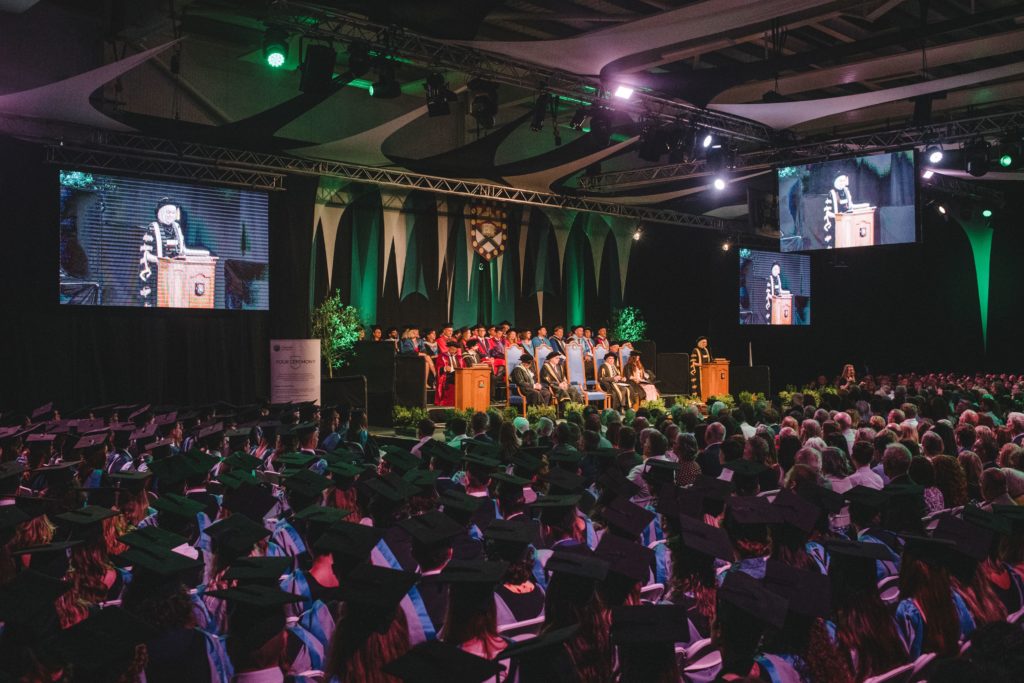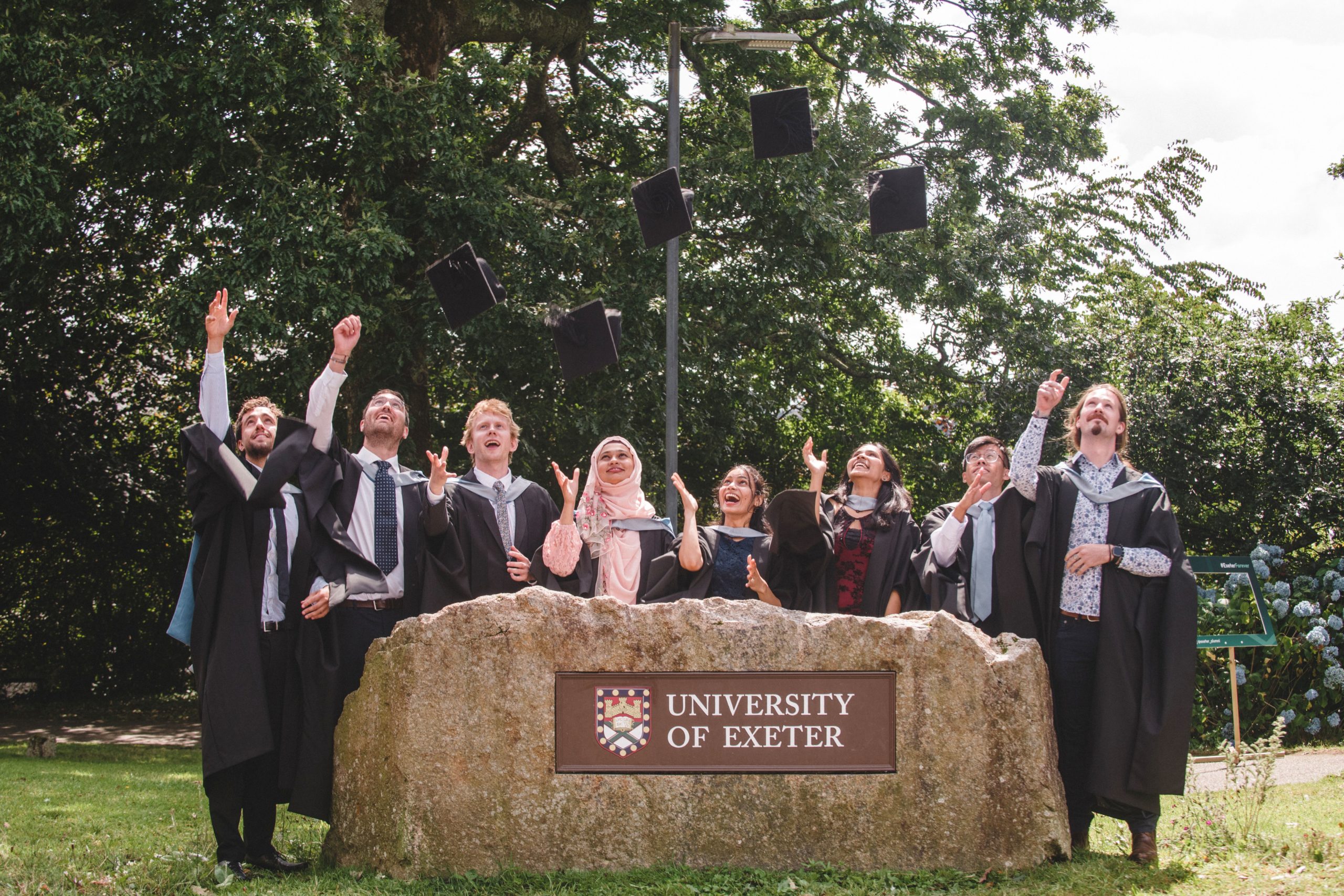We caught up with some of our brilliant (and newest) alumni as they celebrated their graduation in the Italian Gardens on Penryn Campus. They share their best bits, biggest lessons and what they’ve been up to since handing in their research projects last September!
Meet our graduates:







(top left to right)
- Divyeshi: Applied Data Science (Renewable Energy) MSc
- Shanza: Renewable Energy Engineering MSc
- Claudia: Conservation & Biodiversity MSc
- Evie: Conservation & Biodiversity MSc
- Kat: Evolution, Behaviour & Ecology MSc
- Keith: Renewable Energy Engineering MSc
- Grace: Marine Vertebrate Ecology & Conservation MSc
- Dayonni: Marine Vertebrate Ecology & Conservation MSc
- Victoria: Mining Engineering MSc
Tell us about your research project. What did you study?
Shanza: My dissertation was really huge, it was on sustainable building. Making the buildings really sustainable, including glazing and energy and everything.
Keith: So my thesis topic was about exploring the electricity market in the UK and then see what will be the influence when there’s more renewable installation, adding that into the grid and its effects. Including the energy price and market trading. Before that, we have to get quite a good understanding of the market. And I think that’s the most exciting part of it because I got the chance to interview with some key market players during my dissertation, and I really enjoyed it.
Kat: How the impact of artificial light affects moth, like colour finding dynamics in terms of how they find flowers of certain colours.
Claudia: Human-wildlife conflict in Kenya, looking at spatial-temporal dynamics.
Evie: Traits of invasive species in Caribbean Islands
Victoria: My thesis was looking at polluting mine water run-up and recovering metals from it without using hard chemicals that generate a lot of waste, but produce clean water. I am really passionate about the environmental impact of mining and it’s going to be so vitally important for the green transition. We’re going to need so many more metals and I really want to make sure that we do mining in a more responsible and sustainable way.
What was your favourite think about studying your MSc here in Cornwall?

Shanza: It couldn’t be possible without the support of everyone, lecturers and family, and especially the sleepless nights in the Master’s Suite [study area specifically for postgraduate students] and the labs. I can still remember that! I spent more time over there as compared to my room, trust me…
Keith: The favourite part I would say is my classmates, the people. This is the part I enjoy the most because they are all coming from different countries, very diverse, and we got a chance to having dinner and party together. So I like the time that we shared and and the culture and we celebrate that as well. It was very enjoyable.
Kat: The highlight has to be the Kenya Field Course*, just seeing all the wildlife, but also kind of mixing with each other and getting to know everyone else on the cohort really, really well was super lovely.
Evie: The trip to Kenya! It was very hard, but it was a good experience. It was bonding!
Claudia: Fieldtrips! I loved it. I mean two safaris a day! It [the Field Course to Kenya] was the best camping experience of my life, even though it was probably the hardest as well. It was so good. Honestly, the people, the place. I came back to Falmouth and I didn’t realise how much I’d loved it. So I always said, oh, I love Falmouth and I came back last night and I was like, wait, this is home!
Dayonni: This is going to sound a bit controversial, but probably meeting Grace or like networking, like meeting the connections I made during uni.
Grace: I would definitely say the people that you meet and make friends with. Even the lecturers as well. I think just everyone’s very friendly and that was my favourite part too.
Divyeshi: So, favorite thing about the university, the first thing is Glasney [Student Village], where we all lived together, we cooked the food together. When there is the phase for dissertations where are all stressed, our friends will help to keep you calm. So that’s the one thing I like about it.
Victoria: Pint and pasty nights! I’m also a keen scuba diver, so it was lovely to be able to walk off to a beautiful sandy beach and see all the natural beauty around us in Cornwall.
What made you study your degree?
Kat: I did zoology down here [Penryn] as an undergrad and I just absolutely love the behavioural ecology aspect of it. So knowing what I wanted to do as a career, it was automatically going to be the next step for me. And EBE [Evolution, Behaviour & Ecology MSc] was just the perfect programme, the perfect weighting, behavioural ecology, throwing a bit of evolution into the mix, I knew I was going to do it.
Dayonni: I’d say I just purely looked at the degree, never been to Cornwall, never really was, specifically interested in coming here. I just thought the degree and all the modules that they offered were really good, so I decided to apply here.
Grace: My friend studied here and I came to visit her. And I just loved it. I mean, I’ve always loved being by the beach, so that was already a tick and then I looked around and it was just beautiful. And then I think because it [Marine Vertebrate Ecology & Conservation MSc] delved more into the conservation side of it. So that for me was the winning point.
Tell us about what you’ve been up to since handing in your thesis last September?
Shanza: So after doing my master’s, I immediately I joined my PhD. So I’m doing my PhD over here [University of Exeter]. So maybe I’ll see you after two years again!
Keith: I have found a job about grid connection. In future there will be more available installations. I think that’s the trend as well for solar, for example, wind turbines, and they all need to be connected to the grid. And the company I’m working at now is specific for that project, it’s really my interest. I like to work in that the construction phase of this type of project as well. So yeah, I’m really enjoying it.
Kat: Since I handed in I’ve started a PhD down here in Penryn as well. I study how artificial light impacts predator-prey dynamics with the same supervisor as my masters as well, so it links in really well.
Claudia: I’m currently working in Essex with the RSPB, but I’m based in London.
Dayonni: I’m going to continue on with my academic life. I’m doing a PhD and it’s mostly centred in oceanography. but I’ll be investigating upwelling systems in the Galapagos Islands and like how that combines with environmental factors and biological factors like phytoplankton.
Grace: I’m just doing the classic, applying for graduate jobs, hoping to get somewhere in conservation. But who knows, only time will tell!

These interviews are transcribed and in places have been slightly edited for clarity.
*The Evolution, Behaviour & Ecology field course options have changes since Kat studied her MSc. Students can now choose between a low-carbon rewilding field course to Scotland, or an international field course to the Galapagos Islands.

